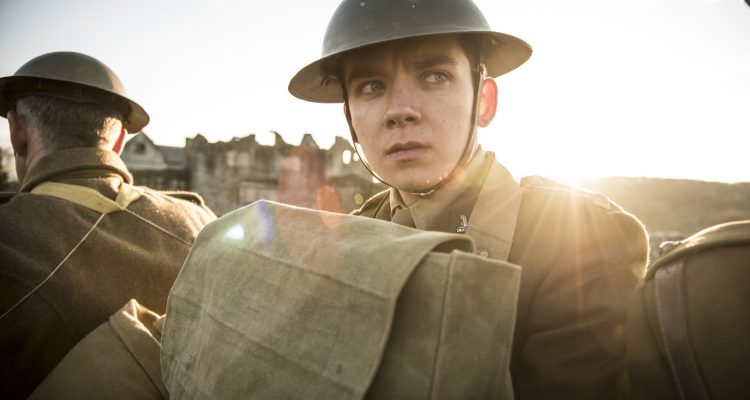While it sometimes feels that you can’t move from WWII movies (this summer’s megahit “Dunkirk” first and foremost among them recently), its predecessor is more neglected in cinema on the whole. A number of great films have been made about WWI (or The Great War, as it was known at the time), including Oscar-winner “All Quiet On The Western Front,” Stanley Kubrick’s “Paths Of Glory” and Peter Weir’s “Gallipoli,” but it’s been a while since the last really notable one, beyond it serving as a slightly queasy backdrop for “Wonder Woman.”
It’s a harder conflict to make work cinematically in a lot of ways . Four years of brutal trench warfare as literally millions of men were gunned down or gassed over, and conflict without the clear good-and-evil dichotomy of the 1939-1945 war, it’s a battle almost unmatched in history for horror or squalor. But now, a classic work of WWI literature returns to the big screen for the first time in nearly 90 years, and it’s an adaptation that, if not quite a classic, deserves to be mentioned in the same breath as the best films to take on the subject.
First performed on stage in 1928, and brought to the screen by “Frankenstein” director James Whale two years later, R.C Sherriff’s “Journey’s End” is faithfully but smartly adapted here by writer Simon Reade (“Private Peaceful”) and director Saul Dibb (“Bullet Boy,” “The Duchess”). Like the play, it’s set on the Western Front, on the eve of what would later be known as the Spring Offensive, the last push by the German army that would come to cost the lives of 800,000 men.
Fresh-faced officer Raleigh (Asa Butterfield) is newly arrived and eager to get into the action. He’s particularly keen to see his old school chum Stanhope (Sam Claflin), whose sweetheart is Raleigh’s sister, and asks to be posted to his company. But when he arrives in the trenches, he finds that Stanhope isn’t the man he remembers. Hardened to stone by the years of war, he’s a spiky mess who drinks through the day, and who’s furious to see his former pal, in case he reports back to his sister.
The company — which includes leader and former schoolteacher Osborne (Paul Bettany), who the men know as ‘Uncle’; cheery Northerner Trotter (Stephen Graham), semi-competent cook Mason (Toby Jones), and posho Hibbert (Tom Sturridge), who’s even more of a drink-sodden, shell-shocked mess than his commanding officer — are aware that Germany’s attack could come at any moment, but soon word arrives that it’ll be on Thursday, just three days away. Then the colonel (Robert Glenister) announces that he needs two officers to lead a raid on the enemy trenches to capture a German soldier to interrogate, a raid that’s almost certainly a suicide mission.
Even if you didn’t know that “Journey’s End” was initially a play, you’d perhaps guess it as most of the action takes place in a single room — the officer’s quarters of the trench. And yet it doesn’t feel stagy. Reade’s screenplay adds some new moments that feel entirely fitting with the main framework, and Dibb takes full advantage of the trench sets for long handheld shots, as well as a couple of impressively chaotic sequences that, sure, aren’t reinventing the form, yet they capture the senseless slaughter without remotely glorifying it.
It also looks truly beautiful. Ben Wheatley’s regular DP Laurie Rose lenses the picture, and does probably his finest work yet. There’s a steely blue to the exteriors that’s striking, but it’s the interiors, shot “Barry Lyndon”-style, seemingly entirely with candlelight, that perfectly sets the mood. It’s about as cinematic as a necessarily claustrophobic stage adaptation could be, but still very much based on a play, and as such lives and dies on its cast.
Fortunately, Dibb has a really, really good cast. Claflin has the toughest job here, and there’s a couple of moments where he feels a touch effortful, spittle flowing down his chin as he rages. But on the whole, this is, after “Their Finest,” another seriously impressive turn from an actor who’d been dismissed by many early on in his career. He’s got a natural spikiness as a performer that serves him well here, but he also brings real depth to Stanhope, showing glimpses of the leader he once was before the war reduced him to a shell.
Everyone’s terrific, though: Sturridge brings just enough humanity to the least sympathetic character here, Butterfield gives perhaps his most promising turn yet, Jones is reliably excellent as ever, and Stephen Graham is utterly charming as the warmest presence among the company.
Best in show, however, might be Bettany, an actor whose talents have too often been squandered of late. Decency is a difficult thing to play without creeping into dullness, but the actor is wonderful here as the moral compass of the men, someone who’s held on to himself in the face of horror, but overflows with empathy for those who haven’t managed the same.
It’s perhaps a little too polite, a little too boxy to sit alongside something like “Paths Of Glory,” but “Journey’s End” is about as good an adaptation as you can imagine of the material, and a film with compassion and humanity that goes far beyond its perhaps uncompromisingly prestige-y exterior. And, at a time when global conflict again feels terrifyingly close, it feels as vital as when the stage version premiered 89 years ago. [B+]
Click here for our complete coverage of the 2017 BFI London Film Festival

